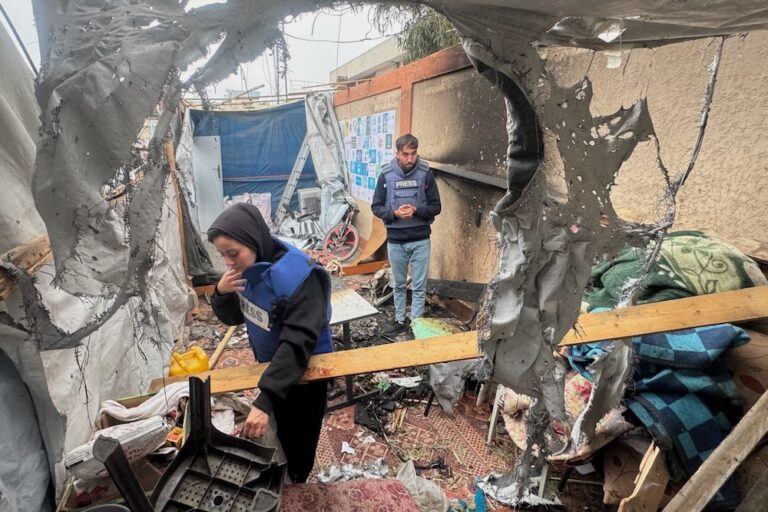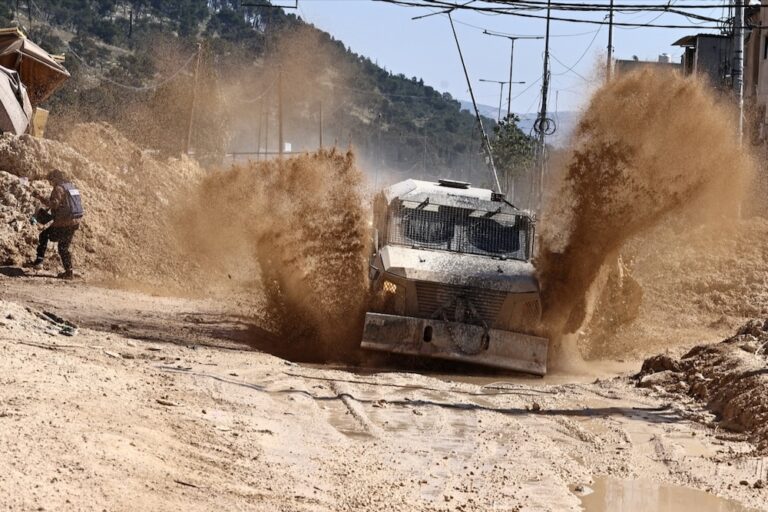Palestinian journalists were harassed and prevented from covering Israel's evacuation of a tent city built by Palestinian activists protesting the government's plan to establish a settlement outpost in the area.
(MADA/IFEX) – 13 January 2013 – The Palestinian Center for Development and Media Freedoms (MADA) strongly condemns the attacks on journalists by the Israeli army during their coverage of the evacuation of the Bab Al Shams village on 13 January 2013. Journalists were detained and forcibly prevented from covering the Israeli military operation to evacuate Palestinians and foreign activists present in the village.
The village of Bab Al Shams is a tent city built by Palestinian activists two days prior to the eviction in a land located east of the city of Jerusalem. Benjamin Netanyahu’s government announced a plan to establish a settlement outpost in that region, which if implemented, would prevent territorial contiguity between the northern and southern regions of the West Bank.
According to the testimonies of journalists on the ground during the evacuation, a number of media workers were detained by soldiers, others were violently denied access to the area, while some had their work disrupted as soldiers shone spotlights on their cameras to thwart the filming of the event. Israeli forces cut the live broadcast of Palestine Public TV three times during the coverage of the event.
Iyad Hamad, cameraman for the Associated Press, told MADA that the number of journalists present exceeded 20 and that they were dealt with severely by Israeli soldiers. “They pushed us violently and I almost fell to the ground. They kept us in a tunnel-like area to prevent us from covering the eviction process. I complained to the Israeli police spokesman present at the site of what we were being exposed to, but he did not care for it and insisted on saying that the army did not treat journalists harshly.” Hamad added that “even after the evacuation of the village, the occupational forces forced journalists to leave the area, and prevented them from sending pictures from the site.”
Palestine Public TV correspondent Haroon Amayreh, who was covering the events directly from inside the village, told MADA, “I was asked by the Israeli spokesman who accompanied the army to interview him, and when I refused, the harassment of Palestine Public TV began. He asked me directly to shut the camera and told me to leave the area because it is a closed military zone. Our transmission cables were then unplugged three times during our coverage.” Amayreh stressed that the situation was menacing and the most difficult he has had to face during his journalistic career. There were almost 1,500 soldiers present.
Raya Media Network cameraman Samer Nazzal told MADA that three soldiers were endowed with the task of shining spotlights at journalists’ cameras so as to prevent pictures of the evacuation process being taken. He added that the soldiers “strongly pushed us and treated us violently,” which, he added, led to the fall of female journalist Rania Hamad Allah from Palestine Public TV to the ground. Nazzal confirmed that the journalists were detained in a low-lying area to prevent them from reporting on the evacuation, he added that there were two Israeli journalists present but the army treated them differently, permitting them to carry out their work unhindered.
The Israeli forces also prevented the Palestine News Network (PNN) crew, including Editor-in-Chief Monjed Jado and cameraman Joseph Saqer, from accessing the village on 12 January 2013. The crew issued a statement, testifying that upon their arrival to the area of Alza’m checkpoint, the Israeli soldiers stopped their clearly marked press vehicle, and asked them for their identity cards and their press cards, they then told them that Palestinian press cards were not recognized and threateningly ordered them to leave the area.
MADA stresses its condemnation of this new attack on freedom of expression. It calls upon the international community to apply pressure on the Israeli government to cease its blatant violations of freedom of expression — a right granted in all international laws and conventions.
WHAT OTHER IFEX MEMBERS ARE SAYING
Israeli soldiers obstruct journalists during eviction (Committee to Protect Journalists)
“Other journalists told the SKeyes Center for Media and Cultural Freedom, a regional press freedom watchdog based in Lebanon, that Israeli soldiers threatened to confiscate their cars and strand them in the remote area if they didn’t leave immediately. Al-Jazeera reporter Waleed al-Amry reported that Al-Jazeera’s team and other journalists were beaten during the eviction, but did not give specifics.”


